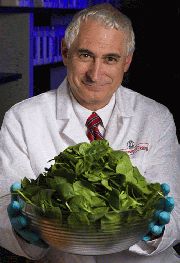I’ve already posted on some of the dubious marketing and safety claims that accompanied the original Fit produce wash before it was abandoned by Procter & Gamble in 2001.
.jpg) On Monday, the Los Angeles Times takes a look at produce washes out there – such as Veggie Wash, Fit Fruit and Vegetable Wash, Bi-O-Kleen Produce Wash, Earth Friendly Products Fruit & Vegetable Wash and Eat Cleaner All Natural Food Wash and Wipes — and concludes water is just fine.
On Monday, the Los Angeles Times takes a look at produce washes out there – such as Veggie Wash, Fit Fruit and Vegetable Wash, Bi-O-Kleen Produce Wash, Earth Friendly Products Fruit & Vegetable Wash and Eat Cleaner All Natural Food Wash and Wipes — and concludes water is just fine.
Sandra McCurdy, extension food safety specialist in the School of Family and Consumer Sciences at the University of Idaho in Moscow, Idaho, says that most produce is pathogen-free because it’s been washed during processing and because handlers take steps to avoid contaminating the fruits and vegetables they stock in the produce aisle. But if it is not, a thorough rinse under water is usually all that’s needed to remove most pathogens.
 Michael Doyle (left), professor and director of the Center for Food Safety at the University of Georgia in Griffin, Ga. (Doyle developed an antimicrobial technology that was licensed earlier this year by the makers of Fit produce wash.) said,
Michael Doyle (left), professor and director of the Center for Food Safety at the University of Georgia in Griffin, Ga. (Doyle developed an antimicrobial technology that was licensed earlier this year by the makers of Fit produce wash.) said,
"If the bacteria get into the tissue during processing, it’s too late, it’s trapped in the tissue.”
As for pesticides, there’s little scientific evidence to support claims that washes do a better job than water when it comes to removing them, says Anne Riederer, a professor of environmental and occupational health at Emory University in Atlanta, Ga.
